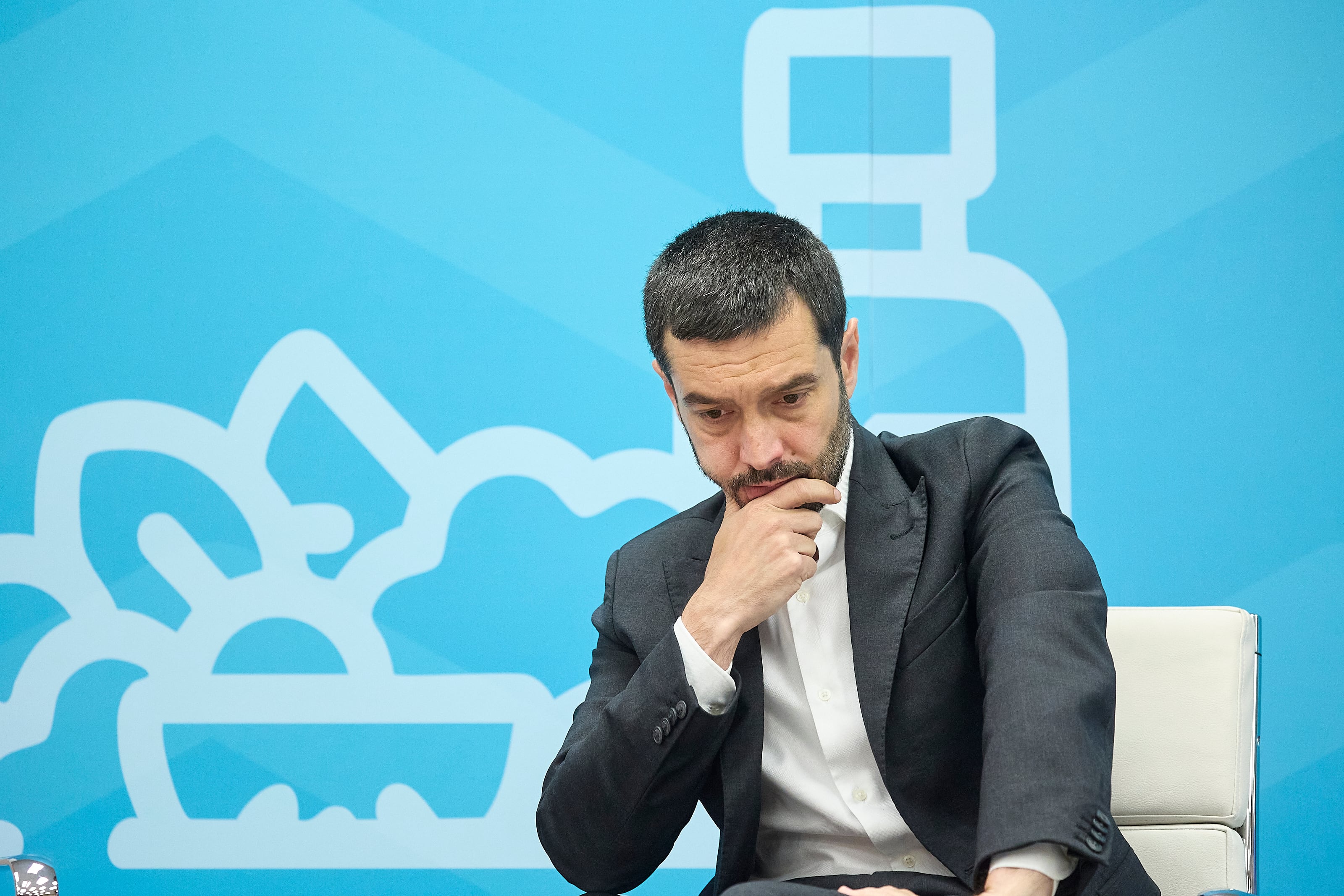« Alise says sensible things » and nine other phrases of a ‘centennial’ political self -portrait | Spain

In front of the vice of pontifying young people, Antoni Gutiérrez-Rubípolitical consultant and communication advisor, he has dedicated himself to listening to them. Your essay Polarization, society and algorithms. An radiography of the new generations (21st century, 2025) gathers not only countless studies and various expert voices, but also adding what was heard in eight discussion groups, known as Focus Groupsa social research technique consisting of gathering a group of people and guiding a conversation to draw conclusions. In this case, a total of 48 young people, six per group, participated in the Focus In Madrid and Barcelona in September last year. They were between 18 and 29 years: generation Z, the calls Centennials. « The most surprising, » explains the author, « was how testimonies were in an almost perfect line with the findings through secondary sources and interviews. »
What follows are ten phrases that offer a self -portrait of a politically explosive generation.
1) « If our parents followed their script, they had the assured future. Following the steps now does not guarantee anything. » Two extended conditions are intertwined. One is precariousness. In Spain, the average age of emancipation exceeds 30 years, according to Eurostat. The other is pessimism. A fact among many: 57% of Centennials They believe that artificial intelligence will hinder its entry into the labor market, according to an international study by Deloitte. Almost half thinks that you will have to move for climate change, another concludes from the European Investment Bank. « The Z generation is the most pessimistic, » says Gutiérrez-Rubí video call, which rescues another phrase from the Focus Groups: « We do not know if we are going to be able to retire. »
« The intergenerational contract is broken. Many young people have lost confidence in the future and in previous generations, » explains the author. Víctor Lapuente, Professor of Political Science at the University of Gothenburg, in Sweden, interviewed in the essay, affirms that this is the result of « intergenerational justice » has been « forgotten » by states of well -being, also Spanish, which prioritize the elderly.
2) « All are the same. They try to deceive you. » In the groups, the perception of politics as a noisy farce. The same girl adds: « Everything is fights. » Another interviewed reveals null trust: « No party can solve what happens. » A recent survey of the Talent Platform for the Future concludes that the Centennials They are the ones who least believe that policies to alleviate housing access problems will serve something, only 7%.
The getz of politics and lack of faith in their results can lead to disdain for democracy itself. In Spain, more than 17% of children under 35 prefer an authoritarian government « in some circumstances, » according to the CIS. In no other age group the percentage reaches 10%.
3) « Alise says sensible things. » Several times the name of the Ultra agitator and conspiranoic Alvise Pérez. « He cares about what we can generate concerns, » says a kid. The growing young political disenchantment is increasingly translated into a vote to the extreme right. It occurs throughout Europe, also in Spain. But the phenomenon is not homogeneous by gender. According to data from the European Election Studies, among those under 25, they supported the extreme right in the European ones almost twice as many men than women. In Spain, for each girl in this strip who voted for Vox and Alvite They did 4.6 boys. Santiago Abascal leads the intention to vote among the men of that age group (21.8%), but not among them (12.7%), with data from the CIS.
4) « You are going with fear of the disco, there is no presumption of innocence of a man. » The phrase is from a boy. These others also: « men have less rights. » « You get a night in the dungeon and then we’ll see if it’s true. » « If there is a man and a woman with the same scores (in a work selection), the woman will enter. » Only 35.1% of young people between 18 and 26 are considered feminist, while in them that percentage amounts to 66%, according to 40DB.
There is an yearning for old roles. An Ipsos survey in 31 countries shows that almost a third of the boys Centennials He believes that a man who stays at home taking care of his children is less man, eleven points more than them. « Male dissatisfaction is growing at these ages, » warns Gutiérrez-Rubí, which attributes it to a mixture of cultural and material causes, such as its progressive salary and educational recoil compared to girls. Thus the researcher synthesizes expanding: “They tell me that I am a privileged, but the girls are smarter, they begin to have better salaries and emancipate before. I look like a Loser (loser) and on top of them they are more protected with political correction. « That’s where the extreme right does.

5) « You can’t comment if you don’t do it as the vast majority. » The Focus Groups An obsession for an alleged omnipresence of « political correction » emerges. « The cancellation limit is increasingly narrow, » says a boy. Gutiérrez-Rubí links it to the growing tendency of political discourse in « sermon tone », which has already warned in the United States famous political advisor James Carville. The Canadian writer Naomi Klein He has also pointed out this « suffocating » inclination, which leaves extremists free to connect with young people, says Gutiérrez-Rubí: « The first thing populists tell young people is: ‘Come with me, here you can say what you want. »
6) « I don’t see the news, I don’t believe them. » The distrust in traditional media It affects all generations. What makes young people different is a greater inclination to pass screen and look for information from non -journalistic sources. Twice appears cited Alise Pérez as a researcher who reveals what the best known media want to « silence. » « In a climate of suspicion and distrust, the attractiveness of the dark internet increases, erected in a kind of catacumba, of meeting place where to exercise beliefs without limitations, » explains Gutiérrez-Rubí, who interviews the anthropologist Carlos Freixa, professor at Pompeu Fabra University, who detects in what he calls the « Generation » Generation Hashtag« A » lack « of » critical ability to question what is published in the networks and Differentiate the truth from bulos »
7) « On Instagram, everything appears from your ideology. » In the face of distrust of journalism, encouraged by an extreme right in growth among the Centennialsa shelter are the networks, where algorithms aquilatate the previous ideas. « Tik tok you greatly reinforce the ideas, » notes a young man.
Gutiérrez-Rubí gives the networks a primary role in the formation of the generational opinion climate, because of the way in which the “extreme right bubbles” catch young people who are only “disenchanted” at the beginning.

8) “The infinite ‘loops’ are horrible for anxiety”. The testimonies Centennials linking the mobile with psychological discomfort are multiple, such as this on the Loopsor immersion loops without greater sense than to continue looking and spending content. Especially toxic are networks. « They make you compare all the time, » is heard in a discussion group. « You waste a lot of time, you get up in the morning and suddenly it is night, the best was your day off, how sad. » They also knot the digital hitch with loneliness. « We are more communicated, but more alone, » says a girl.
Soledad, young people? Wasn’t they just the elders? 34.6% of Spaniards aged 18 to 24 say they feel “unwanted loneliness”, 14 points above the total, according to a study promoted by the Once Foundation. Regarding mental health, almost 60% between 15 and 29 claim to have had problems in the last year, according to a FAD Youth report.
The massive use of networks agrees with another tendency: that of not stopping at all, not palacing anything. « We want things now and when the peak comes, for another, » says a boy. The author of Polarization, loneliness and algorithms alert of the « psychological trap » of the Scroll Before the screen, that continuous content without deepening. « It’s like a hamster on a wheel, » he compares.
9) « One hour of standard is an effort. I can’t stand two movie. » The massive use of networks not only encloses politically and saddens, it also reduces attention capacity. « I have less concentration, » a girl perceives. A young man already seems that in X, before Twitter, there is « more lyrics » than he is « threatened », so he prefers Tik Tok. At the same time that it offers you content, the mobile facilitates you to the next one, and so again and again, explains Gutiérrez-Rubí. « And at the same time the idea is encouraged that I could be losing something. It is a crusher. » The lower capacity for attention and the speed of consumption in turn palate emotional, superficial and populist political speeches. It is a vicious circle.

10) « They blame everything we are. » Several young people protest the popular idea that Centennials They are complaints that sin of « lack of effort. » Gutiérrez-Rubí sees « unfair » the label « glass generation », which « minimizes » its problems. But, in addition, he sees it « counterproductive »: « Young people have a strong anti -system trend by feeling misunderstood and mistreated. If our reaction is labeling them, it will be more difficult to connect. Understanding and mind is needed. And not only by solidarity. The future of all will be influenced by the evolution of generation Z. »




/s3/static.nrc.nl/images/gn4/stripped/data133101536-0efed2.jpg)

